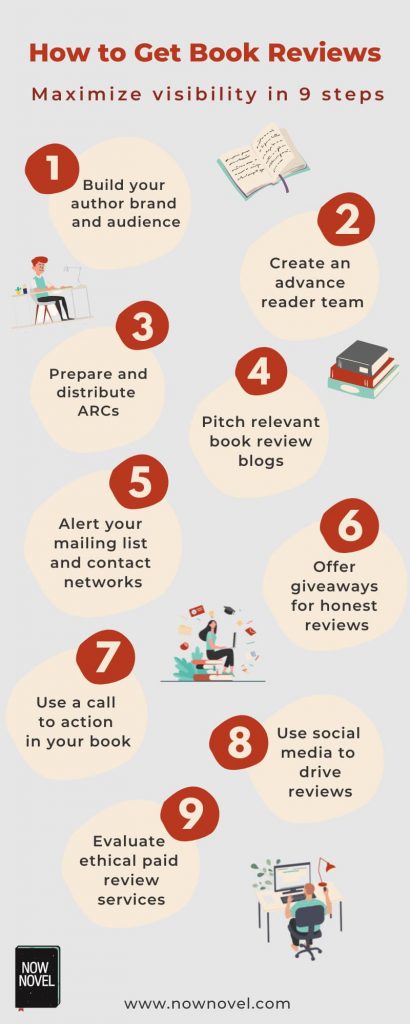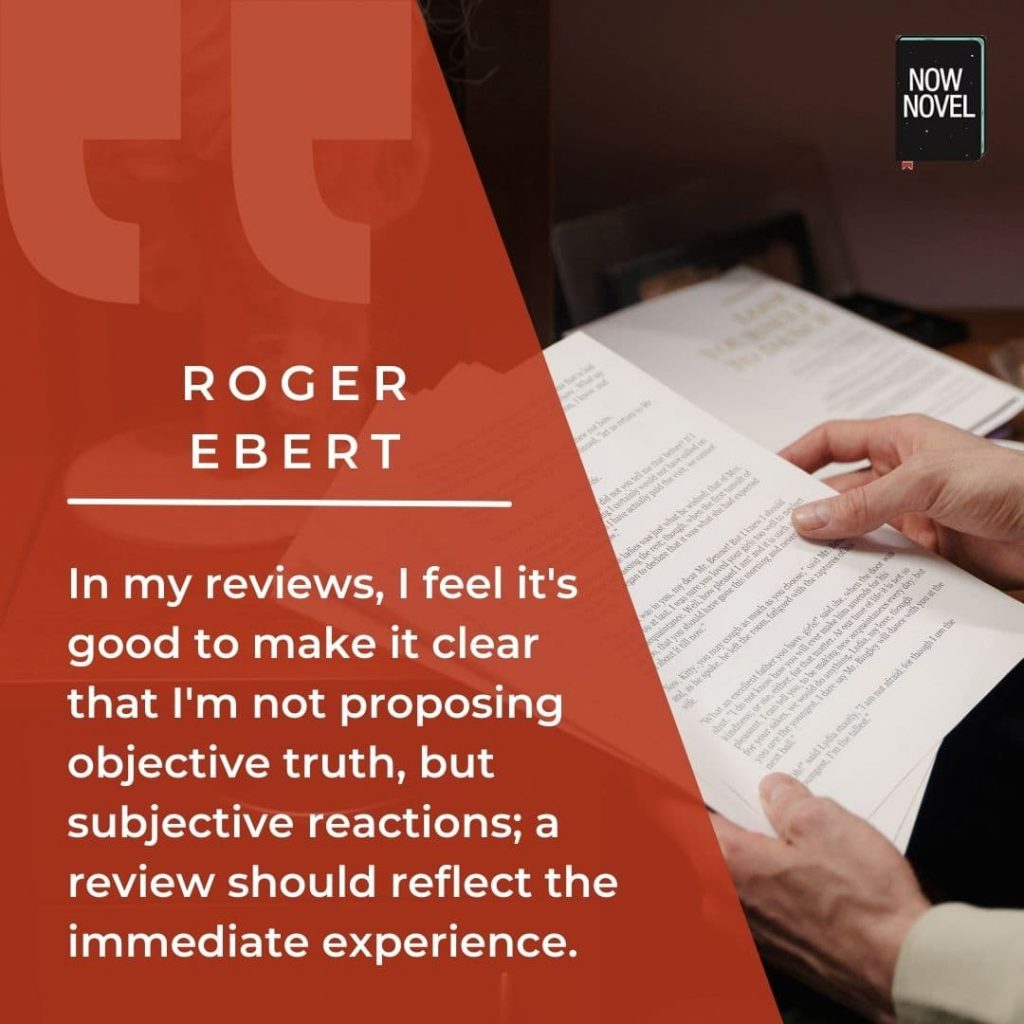When authors go indie and publish a book, how to get book reviews is a common challenge. For Amazon to take notice and start spotlighting your book, you typically need at least 50 reviews. How can you convert readers into reviewers and boost your book’s visibility? Read on for nine steps:
9 steps to get book reviews
- Build your author brand and audience
- Create an advance reader team
- Prepare and distribute ARCs
- Pitch relevant book review blogs
- Alert your mailing list and contact networks
- Offer giveaways for honest reviews
- Use a call to action in your book
- Use social media to drive reviews
- Evaluate ethical paid review services
Let’s dive into getting the feedback your book needs to build potential readers’ trust.
1. Build your author brand and audience
It’s never to early to begin building your brand as an author so you can grow your audience.
Having a platform to market your releases to will make it much easier to acquire the initial reviews that encourage others to follow suit and leave feedback.
In marketing, ‘conversion rates’ refer to the percentage of people who perform a desired action from a larger group. For example, if one in ten readers reviewed your book, you’d need a hundred readers at your conversion rate of reader to reviewer to earn ten reviews.
Because conversion rates to reviews can be low, growing your overall audience is a key part of building your actively reviewing base of readers.
How can you build your author brand and audience?
Think about reader personas
Who would love your books? What demographics do they fit? Which hashtags are they using or following on social media? What language do they use to rave about their favorite reads?
Create a rough reader persona that matches who your target audience is as an author.
Tailor your social media pages (and the content you share) to speak to this kind of reader. Find the overlap between similar reader groups your books may appeal to.
Brand your online presence visually
Your social media author pages present many opportunities to establish who you are and what kind of books you write. What banner might a fantasy author use on Twitter, versus a crime/mystery writer?
Look, for example, at the header for Neil Gaiman’s twitter. The banner advertises newer paperback editions of his books (all designed for strong visual continuity).

The author’s image is a painted portrait – fitting in its expressionist mood for the kind of dark fantasy Gaiman writes. Gaiman’s bio conveys his typical self-deprecating wit.
NY Editors offer excellent author branding advice if you’d like to read up more around building your platform.
Creating a good Goodreads author page provides yet another way to connect with passionate readers and answer their questions.
See, for example, indie pubbing sensation Colleen Hoover’s Goodreads page where she (or an assistant) has answered 270 reader questions.
2. Create an advance reader team
An advance reader team or ‘street team’ is a select group of readers who get perks in exchange for providing honest reviews and other useful feedback.
Author Kerry Lonsdale makes a crucial point about ARCs or advance reader copies (pre-publication copies you share in return for reviews and/or publicity):
It is NOT a free book.
There’s a very specific reason publishers print advance copies for an author, and/or the author’s publicist, to distribute: TO OBTAIN EARLY REVIEWS TO INCREASE READER AWARENESS.
Basically, it’s to build book buzz.
Kerry Lonsdale, ‘How to be an Advance Reader’, accessed June 2022.
So how can you create an advance reader team who help you build pre- and post-launch buzz for your book?
Canvas your mailing list or social network to become advance readers
You could create a Google Forms survey to qualify potential advance readers.
Ask questions such as, ‘would you be willing to leave fair, honest Goodreads reviews in exchange for advance copies of my books?’
Remember to include an input field where potential advance readers can leave their email so you can follow up with those whose answers suit your needs best.
Another good place to find potential reviewers is your critique circle, if you belong to one. Offer to swap generous book reviews with other members come launch day.
Create an exclusive Facebook or other group for advance readers
In the article linked above, Lonsdale references a ‘secret’ group for her advance readers called the ‘Tiki Lounge’, where the author shares news about upcoming releases and more to do with her writing with select readers.
Use advance reader services
There are reputable sites and services where you can list digital advance review copies of your books and get connected to book reviewers and bloggers in your genre.
NetGalley is an example of such a service for authors (with the tagline ‘we help books succeed’).
Keep in mind that these services can be costly (at time of writing, to list one digital review copy with NetGalley for six months costs US$499).
Edelweiss by Above the Treeline is another book review platform connecting booksellers and publishers to professional reviewers, librarians and others.

Prepare to launch your book
Join a course led by multi-published authors and learn how to publish and promote your book..
Learn more3. Prepare and distribute ARCs
If you’re preparing advance review copies to generate book buzz, there are several things to include in your digital copies:
- Prominent statement ‘Advance uncorrected proof / not for sale’ on front and/or back cover
- A brief description/blurb on the back cover (if distributing physical copies)
- Publishing information such as key publicity person to contact (yourself if you are doing everything DIY)
IngramSpark offers a guide to prepping your ARC books, including the above and more.
Who should you share advance review copies of your books with?
4. Pitch relevant book review blogs
If you’re wondering how to get book reviews on websites rather than directly on a platform such as Amazon, book review blogs are one option.
It’s important to pitch relevant book review blogs whose readers are likely to be within your target audience. Bigger media sites, the likes of The Guardian, likely have their reviews lined up long in advance so it’s worth approaching mid-weight sites that may not have as high competition for features.
How can you determine whether a book review blog is worth pitching?
- It reviews similar books in genre and/or subject matter
- Reviews on the blog are fair and detailed (no brutal hatchet jobs)
- The site owners state they are open to review copy submissions
The Book Review Directory has a useful list of book review blogs, including what genre(s) each site specializes in.
You could also Google ‘book reviews’ + ‘your genre/subgenre’ (e.g. ‘book reviews’ + ‘dark fantasy’) to find sites that regularly review similar titles.
How to pitch book review blogs successfully
Pitching blogs to review your book is similar to querying. Make sure you:
- Have a succinct query that addresses the editor who would be reviewing your book or the blog editor by name
- Reach out to blogs that do regularly review your genre and are open to being sent review copies
- Track who you’ve pitched your ARCs to for review in a spreadsheet so you don’t duplicate effort (or have the embarrassment of pitching the same person twice – easy to do)
5. Alert your mailing list and contact networks
When you’re preparing to publish, draft copy for emails to send your mailing list and social media posts to share to any social media platforms you have created author pages for.
When your book is live on your chosen platform, you could even create a direct link to review to send readers in an email, as Dave Chesson of Kindlepreneur suggests here.
LinkedIn is another great platform for sharing your publishing news, as are private social platform groups like Kerry Lonsdale mentions in the linked article above.
The Write Life put together a list of Facebook groups for authors, and you can Google to easily find many more. Just make sure you read a group’s rules and terms for posting before sharing any book promo or review requests.
6. Offer giveaways for honest reviews
Another strategy for how to get book reviews is to offer giveaways in exchange for reviews.
The caveat with this method is you can’t run giveaways that break your review platform’s user terms.
For Amazon KDP, for example, this means you can’t incentivize the review itself (you can’t offer a prize in exchange for a review).
You can, however, send a link to review and incentivize following the link to Amazon, as this is not considered the same as ‘buying’ a review.
If you have written a series, you could offer your first title for free in exchange for a review for a limited time, or use other giveaway strategies while showcasing the most important message: That you would value your readers taking the time to share honest, generous feedback.
BookBub has a list of 24 ideas for prizes for book promo giveaways that may be useful for deciding what you’ll offer potential reviewers.
7. Use a call to action in your book
Another way to get more book reviews is to use a call to action in your book.
Traditional publishers may be leery of this (and will likely have their own publicity teams for getting reviews into the public domain). Yet in an indie release you can do as you please.
You could include an author’s note, asking your readers to review your book on Goodreads and Amazon (and connect with you on these or other platforms), in the front or back pages.
A call to action to a reader who has already voted with their money to support your writing is a powerful way to ask directly for the public, trust-building feedback you need.
This is something both Dave Chesson and Joanna Penn suggest in their linked articles on ways to get more reviews for your books.
We directly ask Now Novel members we’ve built great relationships with for reviews, which is how we get five-star feedback such as Jim’s below:
8. Use social media to drive reviews
Conversion rates from social media may be low. Especially on platforms where users tend to hang around and not click through to websites much (such as Pinterest, where clicks from impressions can be as low as 0.20%).
There are several ways to use social media to drive reviews, though:
Ask for reviews directly
You will find many indie authors and aspiring writers using hashtags such as #writingcommunity and #writerslift on Twitter. Learn what hashtags authors helping other authors are using on social media. Join the conversation.
If someone is running a ‘free promo’ thread inviting people to share their books, don’t be afraid to share links and request reviews. You may gain followers and writing buddies in the process.
Ask for reviews in social ad comments
If you are doing paid social media promotion of your author page or for a specific book release, you may get comments from readers who read and loved your book. Don’t be afraid to reply in the comments and ask for reviews on platforms such as Amazon or Goodreads, as Joanna Penn suggests.
Remember, most of all, that social media is a conversation, not a monologue.
Spend a little time for each thing you post about yourself and your publishing journey resharing others’ good news, questions, memes and other content (but also check that it is likely to resonate with your own audience and the reader personas you’ve branded your author pages to speak to).
PublishDrive has a helpful beginner’s guide to launching your book via social media.
9. Evaluate ethical paid review services
When you have editing, cover design and other costs to consider, you may not have much budget to spend on getting book reviews.
The whole idea of paying for book reviews may also seem unethical to you. But a proper paid review is not a lying shill for your book. It’s a service offered by a reader or service provider that knows your genre – a qualified reader who is more likely to be kind in how they word their feedback than ‘DNF’ (did not finish) Goodreads reviewers are.
If you really need a boost to reviews of your book, paying for reviews is an option, but making sure you go the transparent, ethical route will ensure that non-paid readers/reviewers don’t smell a rat (nor your publishing platform).
Kirkus book reviews and similar services provide a transparent process where you submit your manuscript to qualified reviewers who are carefully vetted.
You can choose whether to keep your reviews private, manually excerpt positive reviews when you share snippets elsewhere (such as in book descriptions on publishing platforms), or post your reviews publicly on the platform.
Platforms connecting reviewing readers with authors such as Reedsy Discovery also provide ways to get your books in the hands of the right readers who are passionate not only about reading but sharing detailed, eloquent feedback too.
Learn all about publishing, book promo and everything you need for a successful launch on our course, How to Publish and Promote your Novel.






2 replies on “How to get book reviews: Max visibility in 9 steps”
I don’t want keep commenting but thus far your articles are being a true asset to my writing wheelhouse on story techniques & business side.
Hi Crawford, please do keep commenting. We really appreciate feedback from readers of the Now Novel blog, and are always glad to hear we’ve helped writers. Here’s to the expansion of said wheelhouse 🙂 Thanks for reading.